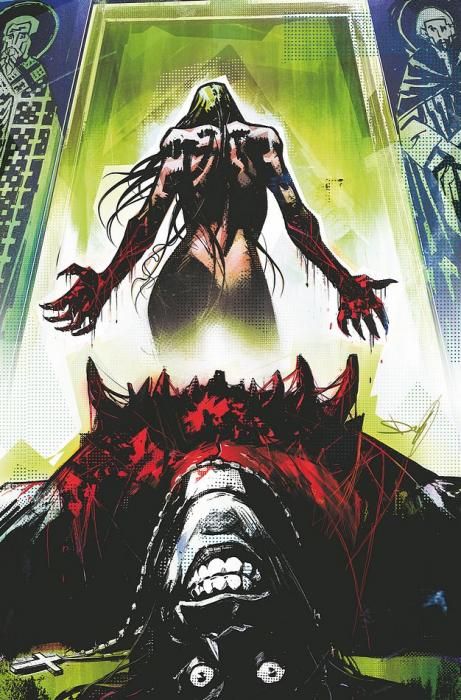After the pretty solid "Ajax" story, "Greek Street" limps to a conclusion with a two-part finale that is a textbook example of how not to structure your comic. Hopefully, this isn't how Peter Milligan planned to execute issue 15 before the axe came down, because it's rushed, sloppy, and nearly impenetrable - and I've read every issue of the series. It picks up where issue 11 left off basically, pretending like "Ajax" never happened, while also introducing new characters that seem to play a major role, but haven't been mentioned yet. All hope of this book going on a high note seems lost.
Beginning with the murder of Lord Menon, most of the issue revolves around Mischa, the disfigured, dead woman that's come back to life and killed numerous people throughout the series so far. The police want her caught and so do the Fureys; everything at this point seems to relate to that plot. It makes sense to narrow in on one specific subplot of the book to resolve, but this one doesn't jump out as the most logical, seemingly offering no real insight given that the point of the character has been apparent for a while now.
Most baffling is the introduction of three aliens that are meant to, possibly, represent the gods. They begin commenting on events a third of the way into the issue and come off as important players, the ones controlling things, except not really? It's not entirely clear and doesn't fit into the rest of the issue, or the series in general. Perhaps if the foundations had been laid earlier, but to introduce them in the second-last issue seems like a missed opportunity.
The return of Davide Gianfelice to the book is nice, even if it is just for the final two issues. The idea of departing from the regular ensemble cast while he took a few issues off sounded better before the book's imminent demise was announced and Gianfelice coming back to draw the rushed wrap-up story seems like a waste. His art makes the individual scenes read better with his strong handle on the characters, their body language, and facial expressions. It accentuates the positives of Milligan's writing like his strong dialogue.
The most interesting part of Gianfelice's art is the aliens/gods/whatever-they-are, drawn as sketchy, malleable, partially formed beings floating in space, watching the Earth. They have the vague features of humans, but seem less defined, more like abstract concepts of what a person should look like. They're exaggerated in various places like larger eyes, more oblong skulls, and free-flowing limbs. They don't fit into the visual landscape of the book, but that's definitely a positive considering their implied roles.
"Greek Street" comes to an end next issue and its final story arc looks like a half-hearted attempt to wrap things up quickly and cram in part of the larger, long term plans for the book. It's not successful, especially as a follow-up to a three-issue departure arc that left almost every character from the book off-panel. It's a jarring read and a pretty good argument for why the book should end, no matter what the sales chart says.

